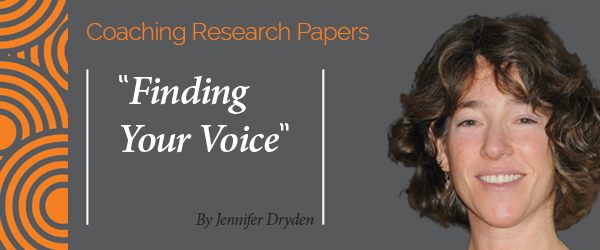Research Paper By Jennifer Dryden
(Motivational Life Coach, UNITED STATES)
“Be who you are and say what you feel,
because those who mind don’t matter,
and those who matter don’t mind.”
― Dr. Seuss
Introduction
Often times, when we are uncomfortable in a situation, we may find it difficult to speak. We might start talking in a choked & nervous or shrill, high-pitched voice. We may find ourselves prefacing our statements with “I know this is probably wrong, but…” Or, perhaps, we may be unable to speak at all, our voices literally ‘paralyzed’ with fear. If you find yourself frequently in these kind of situations at work or in your personal relationships, then it is important for you to start learning how to find your True Voice. This is the voice you use when you are feeling, safe, relaxed, sure and confident. Your voice is the mechanism you use to convey your thoughts, feelings, opinions and passions. It reflects your individual personality and expresses how you feel about yourself in the world.
The sound of your voice, rather than the words you are speaking, is what most people are likely to be listening to. According to Dr. Joan Kenley, author ofVoice Power:
A Breakthrough Method to enhance Your Speaking Voice, the way you say something can have over 5 times the impact of the actual words you are using. She states that the sound of your voice is what communicates your own positive qualities, inspires people and energizes organizations.
Anne Karpf, in her book “The Human Voice”, points out that
Throughout our lives we make decisions, often unwittingly, on the basis of the sound of a person’s voice: lovers as well as political candidates get selected for vocal reasons.
One study conducted at the University of California at Los Angeles indicated that up to 93 percent of communication effectiveness is determined by nonverbal cues. Another study indicated that the impact of communication was determined 7 percent by the words used, 38 percent by voice quality, and 55 percent by nonverbal communication or body language.1
In his book “Vocal Power: Harnessing the Power Within”, Arthur Samuel Joseph asks “Have you ever noticed that there are very few successful people with bad voices?” A “bad” voice might be one that is shrill, whiney, plaintive, petulant, weak and breathy, defensive or bellowing. These types of voices are annoying and repellant, discouraging others from wanting to interact with or truly hear what the speaker has to say. There is also the “ineffective” voice – one that conveys hesitation, feelings of insecurity, or even worthlessness. It is hard to respect someone or take them seriously when they are speaking in this way.
Conveying the qualities of warmth, humor, sureness, patience, compassion and confidence inspires others to listen to and trust you. Practicing speaking in a way that conveys these qualities can help you to feel more self-assured, which, in turn, will allow others to take you more seriously and treat you with respect.
The Process
Finding your Voice involves learning to speak in a way that truly expresses your sense of self. This process will probably require some soul-searching, in order to discover your authentic feelings and desires, along with any beliefs that might be
preventing you from speaking and communicating with confidence. It will also involve identifying your fears and insecurities, so as to be able to let go of them and move forward. Practicing pacing your words, speaking more clearly and deliberately, and eliminating fillers such as “like” and “um” will also help to create a stronger sense of confidence. Later in your journey, you may find that speaking up about things you feel are important or voicing your opinion on a difficult issue, will help you to solidify your sense of inner strength, assurance and power. We will cover each of these areas more in-depth.
The Exercise
According to Dr. Joan Kenley,
Communication of your personal energy is vital for your health, well-being, and self-expression. But exactly how is it communicated? To a great extent, it is by your vocal quality.
However, in order to communicate your personal energy, you first need to get in touch with it, which isn’t always easy.
